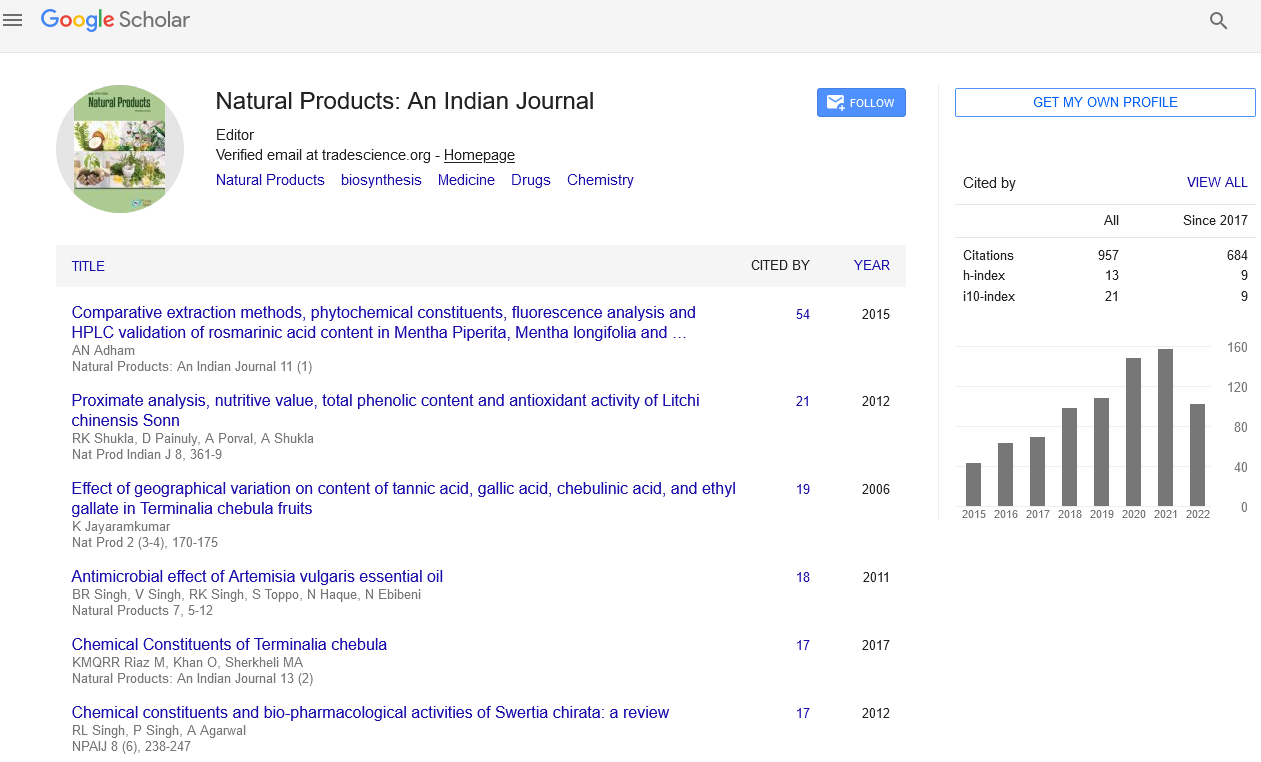Biomolecules And Their Synthetic Analogs
A Biomolecule can be defined as any molecule generally formed by a living organism. It mainly includes macromolecules and micro molecules. The best example for large molecules are Proteins, Nucleic acids, Lipids and Polysaccharides and small molecules such as natural products, Primary and secondary metabolites. Biomolecules are also known as biogenic substances. Synthetic analogs are defined as the artificial compounds differing from the natural compounds in their structure, resemblance and function. Synthetic refers to any material made from non-natural sources. This means that a product such as cloth is made from a chemical source rather than the fibers produced by nature. Biomolecules and their synthetic analogs play vital role in medicine, drug delivery or antiviral agents etc. Most analogues are designed because ""true synthetic"" natural products are hard to make, or are not potent enough.High Impact List of Articles
-
In vitro anti-diabetic activity of parasitic plant, Dendrophthoe falcata (L.f) Ettingsh
Channabasava, M.Govindappa, T.S.SadanandaOriginal Article: Natural Products: An Indian Journal
-
In vitro anti-diabetic activity of parasitic plant, Dendrophthoe falcata (L.f) Ettingsh
Channabasava, M.Govindappa, T.S.SadanandaOriginal Article: Natural Products: An Indian Journal
-
Hepatoprotective and antioxidant effects of Marjorana hortensis plant in CCl4-intoxicated rats
Nehal A.Afifi, Shimaa R.Emam, Mostafa A.Shalaby, Hosney A.El-BannaOriginal Article: Natural Products: An Indian Journal
-
Hepatoprotective and antioxidant effects of Marjorana hortensis plant in CCl4-intoxicated rats
Nehal A.Afifi, Shimaa R.Emam, Mostafa A.Shalaby, Hosney A.El-BannaOriginal Article: Natural Products: An Indian Journal
-
Antimicrobial activity on common pathogens in essential oil of aerial parts of Selinum wallichianum
Bhoj Raj Singh, Vidya Singh, Raj Karan Singh, Saroj Toppo, Nazrul Haque, Ngullie EbibeniOriginal Article: Natural Products: An Indian Journal
-
Antimicrobial activity on common pathogens in essential oil of aerial parts of Selinum wallichianum
Bhoj Raj Singh, Vidya Singh, Raj Karan Singh, Saroj Toppo, Nazrul Haque, Ngullie EbibeniOriginal Article: Natural Products: An Indian Journal
-
Standardization of marketed ayurvedic formulations containing Shatavari and Ashwagandha
N.P.Rajebhosale, A.A.Malpure, V.V.Kadlag, V.S.Kasture, V.M.AurangabadkarOriginal Article: Natural Products: An Indian Journal
-
Standardization of marketed ayurvedic formulations containing Shatavari and Ashwagandha
N.P.Rajebhosale, A.A.Malpure, V.V.Kadlag, V.S.Kasture, V.M.AurangabadkarOriginal Article: Natural Products: An Indian Journal
-
Sulfanilamide, Sulfadoxine And Sulfamethoxazole As New Spectrophotometric Reagents For The Determination Of Cardanol-An Agriculture By-Product
Akheel Ahmed Syed, Ayesha Syeda, Narasaraju Murthy ENKOriginal Article: Natural Products: An Indian Journal
-
Sulfanilamide, Sulfadoxine And Sulfamethoxazole As New Spectrophotometric Reagents For The Determination Of Cardanol-An Agriculture By-Product
Akheel Ahmed Syed, Ayesha Syeda, Narasaraju Murthy ENKOriginal Article: Natural Products: An Indian Journal

